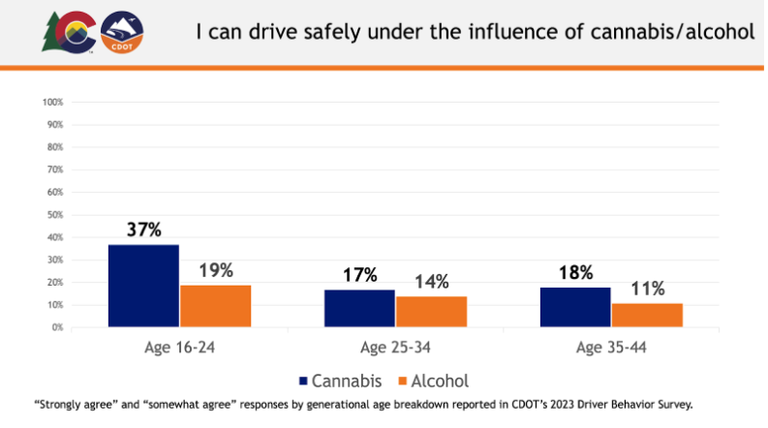Is Gen Z Driving High More Than Other Generations?
Growing Up in the Age of Legal Cannabis
Generation Z is the first generation of Coloradans who have grown up in a state where recreational cannabis is legal. As this group transitions into adulthood, CDOT is examining how the attitudes and behaviors of Gen Z differ from those of previous generations when it comes to driving high.
Who is consuming cannabis and driving?
CDOT’s 2023 survey of nearly 1,000 randomly selected Colorado drivers shows:
- 18–24-year-olds consume cannabis more than twice as often as the average driver (seven times per month vs. three times per month).
- 18–24-year-olds are more than twice as likely to report driving high in the last 30 days.
- One out of five (20%) 18-24-year-old cannabis consumers said they had driven within two hours of using cannabis at least once within the last month compared to 7% of older Colorado cannabis consumers.
In partnership with Native Roots Cannabis Co., CDOT also conducted intercept interviews with customers at the Native Roots Speer Boulevard location. More interviews with cannabis consumers were coordinated through referrals from the agency's communication office. The effort aims to gather valuable insights and feedback to inform future initiatives and messaging strategies.
What does the data show?
While many young cannabis consumers believe that driving high is dangerous, changing perceptions around driving high still has a ways to go. When asked in the survey if they could drive safely under the influence of cannabis, 37% of Gen Z cannabis consumers said yes. For comparison, 17% of those ages 25-34 agreed with the statement.

While CDOT’s survey shows Gen Z respondents report consuming cannabis more often, 2020 DUI case filing data from the Colorado Division of Criminal Justice shows drivers screened for THC and other cannabinoids ages 16-23 had the highest rate of positivity at 62.5%. Drivers ages 24-38 tested positive for THC or other cannabinoids at a rate of 44%. However, traffic safety data spanning the last decade shows the youngest subset is always the most at-risk age group.
What is CDOT’s plan?
CDOT is taking a no-opportunity-left-behind mentality when it comes to reaching those consumers. CDOT’s multi-year initiative with the Colorado DMV includes materials for use by driving schools — in classrooms and online — as well as signage and materials featured at numerous DMV locations throughout Colorado.
CDOT continues to partner with the Colorado Division of Motor Vehicles (DMV) and certified driving schools throughout the state to share the facts of cannabis-impaired driving with young drivers to educate them early. Campaign messaging focuses on how cannabis impairs critical driving abilities and can result in a DUI and other severe consequences. CDOT also believes that working alongside the cannabis industry, targeted advertising, and engaging directly with cannabis consumers in a way that resonates is key to behavior change.
For information and resources on cannabis-impaired driving, visit CDOT’s DriveHighDUI.com website. Additionally, CDOT has partnered with Learn Brands, an online budtender education platform, to provide a free interactive cannabis-impaired driving safety course. View and take CDOT’s Budtender Training Course, linked here.
